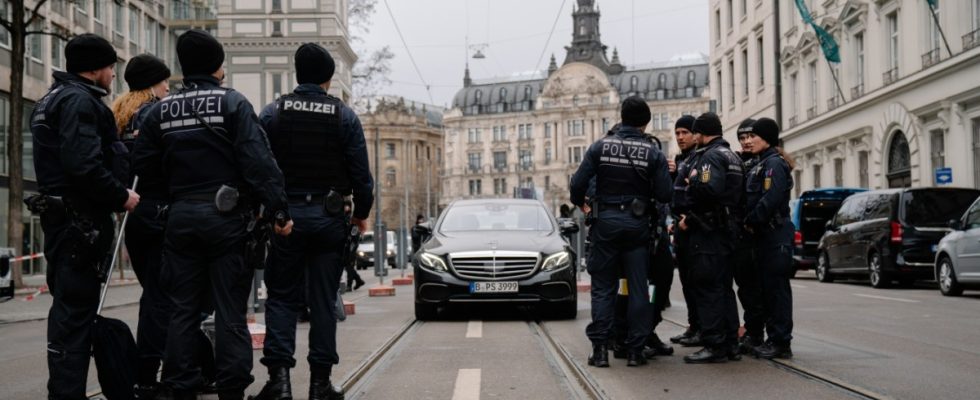The international Munich Security Conference, MSC for short (after its English name “Munich Security Conference”), is now an integral part of the Bavarian capital’s event calendar. Every year, heads of state, heads of government and ministers from all over the world meet at the Hotel Bayerischer Hof to discuss the international situation, this time from next Friday to Sunday. However, like every year, the event will not take place this time. The MSC 2024 is “something special in every respect,” says Michael Dibowski, who, as Vice President of the Munich Police Headquarters, leads the operation surrounding the event.
The special thing about the upcoming Siko, as it is also called, is not that it is celebrating a small anniversary (it is taking place for the 60th time) – the special feature is rather due to the tense world situation, the wars in Ukraine and the Gaza Strip, the crises and conflicts in other places. That’s why MSC organizer Christoph Heusgen expects more participants than ever before: more than 50 heads of state and government, around 60 foreign ministers and more than 25 defense ministers as well as numerous other political and military representatives. The foreign ministers of the western G7 states also want to meet on the sidelines of the conference.
Names of the participating top politicians are traditionally only confirmed by the MSC organizers shortly beforehand. What is known so far: UN Secretary General Antonio Guterres is scheduled to open the conference this year, and Israeli President Yitzhak Herzog will also be attending. The federal government is reportedly represented by Chancellor Olaf Scholz, Foreign Minister Annalena Baerbock, Defense Minister Boris Pistorius, Vice Chancellor Robert Habeck and Finance Minister Christian Lindner.
In addition to all the politicians, there is a number of demonstrators that cannot yet be estimated. “Around 20 meetings have already been registered,” said police deputy Michael Dibowski at a media conference on Tuesday, “and we expect that even more will join spontaneously.”
The police are working with reinforcements
The contingent will be correspondingly large, with which the Munich police want to ensure that all events run as smoothly as possible. More than 5,000 officers will be on duty – that’s an increase on the record number from last year, when around 4,800 ensured security in the city. Because the Munich police cannot muster that many people on their own, they receive reinforcements from the Free State and the entire federal territory. In addition, 200 federal police officers are deployed in their area of responsibility, i.e. in the Munich S-Bahn, train stations and stops.
In view of the geopolitical situation, Dibowski said on Tuesday that he was assuming “an increased abstract danger” for the Siko, but immediately reassured: “There are no concrete indications of threats.” The only real warning from the police headquarters was expressed by its spokesman Andreas Franken as follows: “Munich residents can prepare for more traffic and more disruptions on the weekend.”
On the streets around the traditional conference hotel Bayerischer Hof, the security zone has been expanded to the north; for the first time it now also includes Salvatorstrasse and Salvatorplatz and thus the Rosewood Hotel, which has been used as the second conference location by the MSC organizers. There is also a restriction on air traffic in the air within a radius of 5.5 kilometers above the city center, especially for drones. The prohibited area extends roughly from the Olympic Park to the Perlacher Forest.
You can only access the inner security area directly at Promenadeplatz with special accreditation. However, you are allowed to go to the shops, offices and apartments in the outer security area if you as a resident can “demonstrate a legitimate interest,” says Dibowski. Appropriate corridors have been set up, but visitors should have ID with them and be prepared to be escorted to their destination by police officers. There will also be bag checks. In addition to Promenadeplatz, the entire security area includes Kardinal-Faulhaber-Strasse and Pranner-, Karmeliter- and Hartmannstrasse as well as parts of Pacelli-, Maffei and Salvatorstrasse.
There are closures here
Because of the closures, “there will inevitably be disruptions,” says Dibowski. Buses and trains are also affected. In particular, tram traffic on lines 19 and 21, including the night line N19, will be interrupted from Friday morning at 6 a.m. until Sunday afternoon around 4:30 p.m. The Lenbachplatz, Marienplatz/Theatinerstraße, Nationaltheater and Kammerspiele stops will not be served during this time.
There is also an absolute no-parking policy for vehicles of all kinds in and around the safety zone. Dibowski warns all car owners who park or have parked their car in the city center to “check in good time whether their vehicle is not in a no-parking zone that has now been designated.” From Wednesday evening, illegally parked vehicles will begin to be towed away. Last year there were 152.
Short-term traffic disruptions are expected, especially on Saturday from 12.30 p.m., when the majority of registered meetings take place, including two larger demonstrations. The anti-Siko alliance moves from Stachus via Maximiliansplatz and Odeonsplatz around the city center to Marienplatz; Participants also form a human chain between Karlsplatz and Marienplatz. The “Munich stands up” alliance, which is close to the lateral thinker scene, goes from Königsplatz through Maxvorstadt and back around the same time. The third larger rally will take place at Odeonsplatz and is directed against the war in Ukraine.
Police Vice President Michael Dibrowski doesn’t want to stop Munich residents from visiting the city center, but advises “not necessarily to come by car from Friday to Sunday.” Public transport is less stressful.

